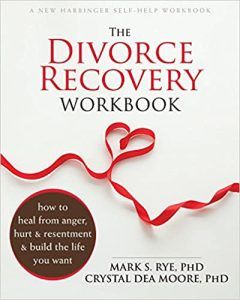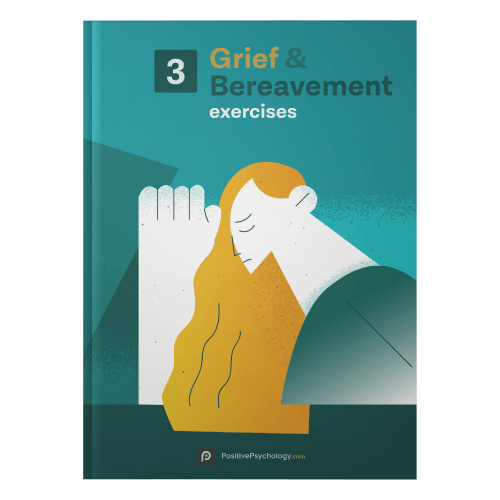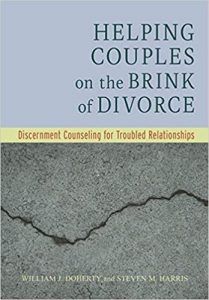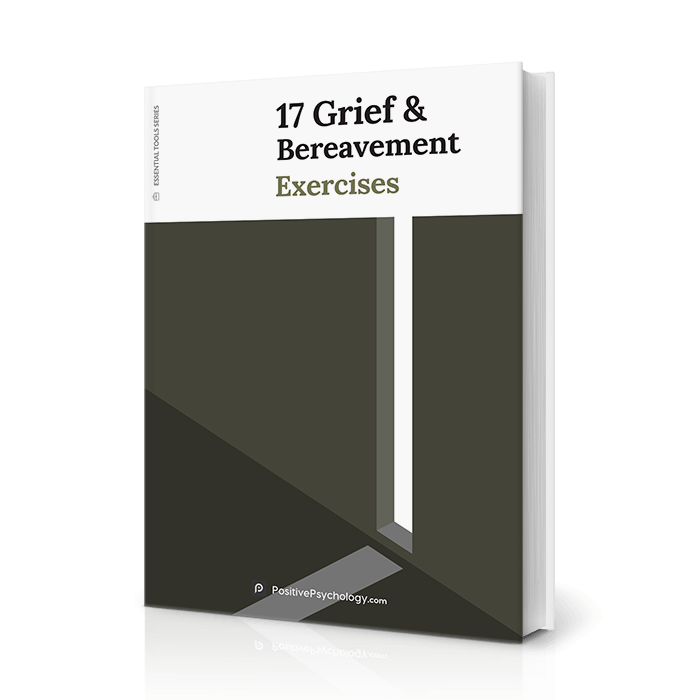Divorce Counseling & Therapy: Best Worksheets & Techniques
 Couples often attend relationship counseling when they are trying to save their marriage.
Couples often attend relationship counseling when they are trying to save their marriage.
If they can’t fix the relationship, or one or both partners have nothing left to give, they may decide to go their separate ways.
A divorce may be the last resort and final shared act for couples who no longer wish to stay with one another.
Counseling can help transition couples through this painful process, even when previous therapy has proven unsuccessful (Brown, 2022).
This article explores what clients can expect from divorce counseling and introduces techniques, questions, and worksheets that can help manage the psychological and practical aspects of their separation.
Before you continue reading, we thought you might like to download our three Grief Exercises [PDF] for free. These science-based tools will help you move yourself or others through grief in a compassionate way.
This Article Contains:
- What Are Divorce Counseling & Therapy?
- Helping Clients Cope With Divorce: 4 Techniques
- 10 Questions to Ask Your Clients in Therapy
- 10 Helpful Coping Skills to Teach Clients
- 6 Best Worksheets & Workbooks for Adults
- Useful Activities for Your Sessions
- Top 2 Books for Divorce Counselors
- Grief and Loss Resources From PositivePsychology.com
- A Take-Home Message
- References
What Are Divorce Counseling & Therapy?
Even when divorce is the best or only option for a couple, it is likely to be a painful process. Both partners will inevitably experience a mixture of feelings, including upset, emotional loss, regret, anger, and even relief, that may lead to a fraught relationship, potentially including (Brown, 2022):
- Repeated and volatile arguments
- Failure to agree on important matters, including finances, where to live, custody, and parental responsibilities
- Lack of communication or frequent misunderstandings
- Shared worries about the impact of the divorce on the children
- Concerns about how to navigate social situations and communicate what is happening to others
Support is available, offering hope for couples trying to cope with a tough time in their lives.
Divorce counseling and therapy can help in several ways, including (Schneider, 2020):
- Offering guidance on sharing news of the decision with children and family
- Helping divide assets and belongings
- Helping reach an agreement on child custody and how best to share parental responsibilities
- Providing the opportunity to bring in children to discuss what is happening and talk about their fears and concerns
- Talking through regrets and remorse about the relationship ending and unfulfilled hopes and dreams
- Creating a foundation upon which post-divorce interactions can exist respectfully and cooperatively, especially when children are concerned
- Making the divorce process more affordable by reaching mutually acceptable agreements early on, avoiding drawn-out legal battles
- Providing a good model for the children regarding how to handle the separation
- Offering emotional support surrounding the grief associated with the end of the relationship, love, support, and related hopes
Helping Clients Cope With Divorce: 4 Techniques

There are counseling approaches and techniques that can help make the process more manageable, especially when things get complicated between partners.
Try working through the following points and techniques with your clients (Smith, 2021; Marriage.com, n.d.):
- Manage your behavior, not theirs
Emotions and tempers can run high during a divorce, leading people to act in ways that may not represent how they truly feel. Whether the other person is being difficult on purpose or as a by-product of feeling hurt, try not to treat them as they are treating you. Otherwise, you are at risk of escalating the situation, ending in a standoff.
Remember that you are not in control of how the other person feels or acts, but you can choose how to behave and respond. Sometimes taking time out can save you from a hasty response that you may regret.
- Expect the unexpected
You may feel that you know your partner completely and can anticipate how they will react to this challenging situation; however, you are in uncharted territory. Hurt and feelings of betrayal can cause people to act in unpredictable and surprising ways.
Before meeting to discuss an important point, take time to think about what you are really hoping for out of the conversation. Note down some points on paper or write them a letter beforehand, explaining what you would like and how the other person’s wellbeing and happiness are equally important.
- Prioritize forgiveness
A divorce can result from one or both partners hurting the other by doing (or not doing) something. As a result, it can be hard to forgive. And yet forgiveness is crucial to moving forward. At some point, you are likely to want to start a new relationship; bringing existing anger will add additional strain and mistrust to something that could be very good for you.
Showing forgiveness is not easy. It is a process that will take time and effort and yet will create a more positive future. Equally, asking for forgiveness for your wrongdoings (actual or perceived) and showing vulnerability can build trust (Brown, 2015).
- Focusing on a brighter future
The divorce process can seem like a dark and hurtful place. It is vital to remember that one or both parties hopes to leave behind a marriage that has failed for a brighter future, either alone or with someone else.
Imagining a happier future can help see you through this upsetting time. Take time to visualize how you see your future life in three months, six months, or a year from now. What positives are you looking for? What could life be like in a new physical or emotional setting?
Take these thoughts with you while discussing difficult subjects to remind you that coming to an agreement now will improve your chance of a more settled future.
10 Questions to Ask Your Clients in Therapy
The following questions are useful to get your clients thinking about what has led them to divorce, whether it is what they really want, and what they can learn from their experiences that can help them create a better future for themselves and others (modified from Bowen, 2017).
Ask your clients to reflect on the following, either in session or as homework:
- Have you really done everything you can to fix this marriage?
- Have you made changes to your behavior?
- Have you truly communicated why you’re unhappy and asked your partner to change anything?
- Have you considered and thought about what your life will be like once you’re divorced?
- Are you prepared for the financial changes?
- How will the divorce affect your children (and how will not divorcing affect your children)?
- Is there anything else that can be done to make you feel better about this marriage?
- Are your expectations for marriage reasonable?
- Do you believe that your marriage is all that it can be, or are you just tired of trying?
- Have you contributed to both the problem and the solution?
Answering these questions is not intended to push the client into changing their mind. There could be excellent reasons for divorce; instead, they promote an understanding of their role in the relationship and how they feel about it ending.
10 Helpful Coping Skills to Teach Clients

Use the following coping skills and techniques with your clients to help them find a way to get through this challenging time (Marriage.com, n.d.):
Leaving a marriage with children
Any divorce is difficult, but a marriage with children brings extra complexity. Your own and your children’s ability to cope with what is happening can be helped by (Pace, 2021):
- Clearly explaining to your children that you are getting divorced, but this doesn’t change your or your partner’s feelings for them.
- Make it clear that they have done nothing wrong and are not to blame.
- Try to show a united front, even if, in the background, there is agreement still to be reached.
- Calm their fears by letting them know they will always have a loving home.
- Be positive and reassure your children.
Coping with anger
Divorce can bring existing or new feelings of anger to the surface that can be difficult to manage. Try the following to help manage those emotions and avoid reacting to your partner out of anger (Sullivan, 2020):
- Recognize when you are starting to feel angry. Keep a check on how you are thinking, your emotions, and physical sensations (such as breathing faster, getting hot, and feeling tense).
- Before you feel out of control, do something different. It could be simply saying, “Give me a minute” or stepping outside and taking several slow, deep breaths. It can be powerful to tell yourself, “It will be OK” or “I am in control.”
- Tabling the remainder of the conversation for another time is better than a heated argument.
- Change how you talk. Rather than saying, “Yes, but …” say things like “I understand …” or “I have had similar feelings …”
- Away from the situation, it can help to write down what causes you to feel angry and describe those feelings in detail. Then focus on times when you have been successful at avoiding getting angry.
6 Best Worksheets & Workbooks for Adults
The following worksheets and workbooks can be shared with clients to help them manage their feelings and the transitions of the divorce process (Marriage.com, n.d.; Smith, 2021).
Divorce Problem-Solving
The divorce process can seem like an endless set of problems to overcome. Divorce therapists can help their clients understand the situation, their thoughts, how they feel, their behavior, and the outcomes.
Ask clients to complete the Divorce Problem-Solving worksheet before, during, or after each problem they encounter as they progress through their divorce.
Grieving After a Divorce
Grief can come in many forms and after various events in life – not just the death of a loved one. Divorce is a form of loss that can lead to emotions similar to grief.
Ask your client to complete the Grieving After a Divorce worksheet to understand their sense of loss.
Facing the Fear of Divorce
Any change can leave us feeling shaken. A significant life change like divorce may leave your client fearful of an unknown future.
Ask your client to complete the Facing the Fear of Divorce worksheet to contrast what could happen with what will happen.
Self-Care During a Divorce
During a divorce, a client’s concerns may be everywhere but their own wellbeing. They may be thinking of their children, their finances, and what others may think and may forget to look after themselves.
Encourage your client to stop and take time for themselves, beginning with completing the Self-Care During a Divorce worksheet to prioritize their needs.
Difficulty Coping After a Divorce
Divorce is a significant event in anyone’s life. As a result, it could have far-reaching consequences for mental health.
Use the Difficulty Coping After a Divorce worksheet with your clients to identify signs that they need to take positive steps for their mental wellbeing.
Moving On to New Relationships
Having just been through a divorce, starting a new relationship may be the last thing on your client’s mind, and yet, the time will most likely come when they are ready to move on.
Use the Moving On to New Relationships worksheet with your clients to get them emotionally and practically ready for connecting with new people after their divorce.
Useful Activities for Your Sessions

Try these two activities with the couple to strengthen communication skills and improve the dialogue during and after their divorce:
- Silent communication
Therapists can use this Silent Connections group activity to improve a couple’s awareness of the impact of nonverbal communication on their own and their partner’s understanding. - The Win-Win Waltz Worksheet
Communication can sometimes seem like a dance between two people. This worksheet can be helpful for clients trying to move from different positions to one of understanding as the details of the divorce are agreed upon.
Top 2 Books for Divorce Counselors
While there are few books dedicated to divorce counseling, we have included two texts that would be a useful addition to any divorce counselor’s library.
1. The Divorce Recovery Workbook: How to Heal From Anger, Hurt, and Resentment and Build the Life You Want – Mark Rye and Crystal Dea Moore

The authors provide a valuable guide for someone who has recently been through a divorce or for counselors helping their clients through the process.
Find the book on Amazon.
2. Helping Couples on the Brink of Divorce: Discernment Counseling for Troubled Relationships – William Doherty and Steven Harris
Counselors must consider each partner’s agenda as they approach a decision on divorce. This book will help and provides specific chapters that deal with affairs and losing love for each other.
Discernment counseling is a valuable approach to short-term counseling that invites couples to keep making the decision to continue the work.
Find the book on Amazon.
Grief and Loss Resources From PositivePsychology.com
Grief can result from any form of loss and should be treated as an important part of therapy.
Grief tools
As grief is something frequently faced at the end of a relationship, why not download our free grief tools pack and try out the powerful tools contained within? Some examples include:
- Drawing Grief Tool
Use this exercise to help grieving clients explore their thoughts and feelings about their loss through drawing. - Objects of Connection
Use this worksheet to help clients discern meaning and functionality in the grieving process.
We have many other resources available for therapists and counselors to support couples as they navigate their relationships and sense of loss.
Other free resources include:
- Grief Sentence Completion Task
These sentence completion tasks help clients consider their feelings regarding loss and change following significant life events. - Relationship Audit
This valuable worksheet provides questions to understand the degree of authenticity within relationships, even ones that are ending.
More extensive versions of the following tools are available with a subscription to the Positive Psychology Toolkit©, but they are described briefly below:
- Identifying Our Expert Companions
Professional expertise and human companionship are essential for those seeking help and growth after seismic life events or trauma.
This exercise helps clients discover what they need from an expert companion, identify potential ones among the variety of people they know, and invite others to become involved.
- Restoring the Broken Mirror Metaphor
When we lose something significant in our lives, such as a relationship, it can be difficult to rebuild meaningful routines or engage in pleasurable activities.
In this exercise (using the metaphor of restoring a broken mirror), clients reflect on their life before and after loss and identify the activities that will help them reconstruct a meaningful life.
If you’re looking for more science-based ways to help others move through grief in a compassionate way, this collection contains 17 validated grief and bereavement exercises. Use them to help others find balance as they attempt to make sense of a life that has been irrevocably changed.
A Take-Home Message
Whether or not a divorce is something both members of a couple want, it is a tough decision, sometimes made to ensure the children’s long-term happiness.
Therefore, the process of divorcing is neither practically nor emotionally straightforward and is likely to impact many areas of your clients’ lives and their children and family.
Divorce counseling and therapy can offer support by talking over difficult situations and providing tools to help cope. Professionals can work through what is best for both partners and their children (if relevant), and discuss the steps to move out of the marriage. Emotionally, a mental health professional provides an unbiased ear; clients can talk openly about their fears, anger, and concerns without reprisal.
Creating a solid foundation upon which the divorce process can rest and a safe place for open dialogue can help present and future situations, especially where parental responsibilities must be balanced and shared.
Try some of the techniques and worksheets shared within the article to help your clients move forward with their lives, leaving an unhappy situation for one where they can build the future they seek.
We hope you benefited from reading this article. Don’t forget to download our three Grief Exercises [PDF] for free.
- Bowen, K. (2017, July 25). 8 Questions to ask before divorce – to couples on the brink of divorce. The Marriage Place. Retrieved April 7, 2022, from https://themarriageplace.com/2017/07/8-questions-to-ask-before-divorce/
- Brown, A. (2022, April 20). What is divorce counseling: What to expect during divorce counseling and are there benefits? Regain. Retrieved April 6, 2022, from https://www.regain.us/advice/divorce/divorce-counseling-what-to-expect-and-are-there-benefits/
- Brown, B. (2015). Daring greatly: How the courage to be vulnerable transforms the way we live, love, parent, and lead. Avery.
- Doherty, W. J., & Harris, S. M. (2017). Helping couples on the brink of divorce: Discernment counseling for troubled relationships. American Psychological Association.
- Marriage.com (n.d.). Help with divorce and reconciliation. Retrieved April 6, 2022, from https://www.marriage.com/advice/divorce/
- Pace, R. (2021, April 23). How to leave a marriage with children. Marriage.com. Retrieved April 7, 2022, from https://www.marriage.com/advice/divorce/how-to-leave-a-marriage-with-children/
- Rye, M. S., & Moore, C. D. (2015). The divorce recovery workbook: How to heal from anger, hurt, and resentment and build the life you want. New Harbinger.
- Schneider, J. (2020, August 30). Divorce counseling: How a divorce counselor can help. Marriage.com. Retrieved April 6, 2022, from https://www.marriage.com/advice/counseling/divorce-counseling-how-a-divorce-counselor-can-help/
- Smith, S. (2021, March 23). 7 Ways on how to survive a nasty divorce and cope with divorce psychosis. Marriage.com. Retrieved April 7, 2022, from https://www.marriage.com/advice/divorce/how-do-you-survive-a-nasty-divorce/
- Sullivan, E. (2020, May 21). Coping with anger. Relate. Retrieved April 7, 2022, from https://planner.relate.org.uk/getting-organised/looking-after-yourself-and-others/coping-anger
Let us know your thoughts
Read other articles by their category
- Body & Brain (49)
- Coaching & Application (57)
- Compassion (26)
- Counseling (51)
- Emotional Intelligence (24)
- Gratitude (18)
- Grief & Bereavement (21)
- Happiness & SWB (40)
- Meaning & Values (26)
- Meditation (20)
- Mindfulness (45)
- Motivation & Goals (45)
- Optimism & Mindset (34)
- Positive CBT (28)
- Positive Communication (20)
- Positive Education (47)
- Positive Emotions (32)
- Positive Leadership (18)
- Positive Parenting (4)
- Positive Psychology (33)
- Positive Workplace (37)
- Productivity (16)
- Relationships (46)
- Resilience & Coping (36)
- Self Awareness (21)
- Self Esteem (38)
- Strengths & Virtues (32)
- Stress & Burnout Prevention (34)
- Theory & Books (46)
- Therapy Exercises (37)
- Types of Therapy (64)






What our readers think
I am suffering with ED, which is due to stress at work (I am a CEO of a shipping company). My wife is unhappy with our sex life. She wants to have affairs with younger men. Should I agree to save our marriage or risk losing her? A divorce would devastate my business also.
J.Monier IMS.
I am actually currently going through a very painful divorce; I am on this vast expansive void of hope called the internet and I was looking for anything, SOMETHING that could give my heart solace for a SECOND, and when I click on your “free” grief exercises you have the nerve to CHARGE!? That was lame.
Hi Lucille,
I’m sorry to hear that you’re going through a painful divorce. Divorce can be an incredibly difficult experience, and I understand that you’re looking for support and comfort during this tough time.
I apologize for any confusion regarding the grief exercises you mentioned. Kindly use the following link to access the exercises by simply providing your email address. In case you encounter any issues with the link, please let us know.
Wishing you strength and healing during this difficult time!
Kind regards,
Julia | Community Manager